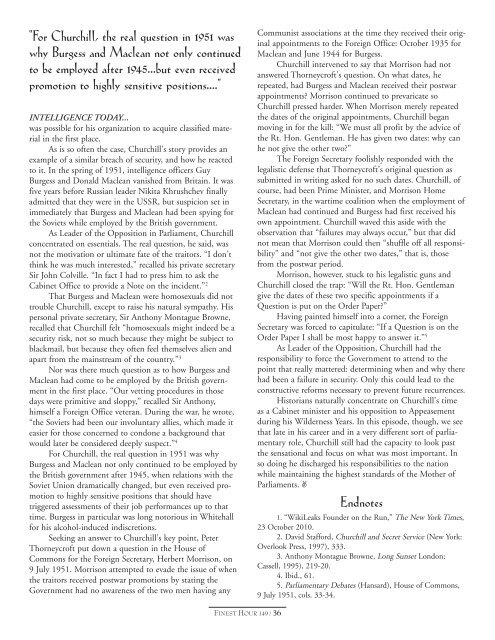Create successful ePaper yourself
Turn your PDF publications into a flip-book with our unique Google optimized e-Paper software.
“For <strong>Churchill</strong>, the real question in 1951 waswhy Burgess and Maclean not only continuedto be employed after 1945...but even receivedpromotion to highly sensitive positions....”INTELLIGENCE TODAY...was possible for his organization to acquire classified materialin the first place.As is so often the case, <strong>Churchill</strong>’s story provides anexample of a similar breach of security, and how he reactedto it. In the spring of 1951, intelligence officers GuyBurgess and Donald Maclean vanished from Britain. It wasfive years before Russian leader Nikita Khrushchev finallyadmitted that they were in the USSR, but suspicion set inimmediately that Burgess and Maclean had been spying forthe Soviets while employed by the British government.As Leader of the Opposition in Parliament, <strong>Churchill</strong>concentrated on essentials. The real question, he said, wasnot the motivation or ultimate fate of the traitors. “I don’tthink he was much interested,” recalled his private secretarySir John Colville. “In fact I had to press him to ask theCabinet Office to provide a Note on the incident.” 2That Burgess and Maclean were homosexuals did nottrouble <strong>Churchill</strong>, except to raise his natural sympathy. Hispersonal private secretary, Sir Anthony Montague Browne,recalled that <strong>Churchill</strong> felt “homosexuals might indeed be asecurity risk, not so much because they might be subject toblackmail, but because they often feel themselves alien andapart from the mainstream of the country.” 3Nor was there much question as to how Burgess andMaclean had come to be employed by the British governmentin the first place. “Our vetting procedures in thosedays were primitive and sloppy,” recalled Sir Anthony,himself a Foreign Office veteran. During the war, he wrote,“the Soviets had been our involuntary allies, which made iteasier for those concerned to condone a background thatwould later be considered deeply suspect.” 4For <strong>Churchill</strong>, the real question in 1951 was whyBurgess and Maclean not only continued to be employed bythe British government after 1945, when relations with theSoviet Union dramatically changed, but even received promotionto highly sensitive positions that should havetriggered assessments of their job performances up to thattime. Burgess in particular was long notorious in Whitehallfor his alcohol-induced indiscretions.Seeking an answer to <strong>Churchill</strong>’s key point, PeterThorneycroft put down a question in the House ofCommons for the Foreign Secretary, Herbert Morrison, on9 July 1951. Morrison attempted to evade the issue of whenthe traitors received postwar promotions by stating theGovernment had no awareness of the two men having anyCommunist associations at the time they received their originalappointments to the Foreign Office: October 1935 forMaclean and June 1944 for Burgess.<strong>Churchill</strong> intervened to say that Morrison had notanswered Thorneycroft’s question. On what dates, herepeated, had Burgess and Maclean received their postwarappointments? Morrison continued to prevaricate so<strong>Churchill</strong> pressed harder. When Morrison merely repeatedthe dates of the original appointments, <strong>Churchill</strong> beganmoving in for the kill: “We must all profit by the advice ofthe Rt. Hon. Gentleman. He has given two dates: why canhe not give the other two?”The Foreign Secretary foolishly responded with thelegalistic defense that Thorneycroft’s original question assubmitted in writing asked for no such dates. <strong>Churchill</strong>, ofcourse, had been Prime Minister, and Morrison HomeSecretary, in the wartime coalition when the employment ofMaclean had continued and Burgess had first received hisown appointment. <strong>Churchill</strong> waved this aside with theobservation that “failures may always occur,” but that didnot mean that Morrison could then “shuffle off all responsibility”and “not give the other two dates,” that is, thosefrom the postwar period.Morrison, however, stuck to his legalistic guns and<strong>Churchill</strong> closed the trap: “Will the Rt. Hon. Gentlemangive the dates of these two specific appointments if aQuestion is put on the Order Paper?”Having painted himself into a corner, the ForeignSecretary was forced to capitulate: “If a Question is on theOrder Paper I shall be most happy to answer it.” 5As Leader of the Opposition, <strong>Churchill</strong> had theresponsibility to force the Government to attend to thepoint that really mattered: determining when and why therehad been a failure in security. Only this could lead to theconstructive reforms necessary to prevent future recurrences.Historians naturally concentrate on <strong>Churchill</strong>’s timeas a Cabinet minister and his opposition to Appeasementduring his Wilderness Years. In this episode, though, we seethat late in his career and in a very different sort of parliamentaryrole, <strong>Churchill</strong> still had the capacity to look pastthe sensational and focus on what was most important. Inso doing he discharged his responsibilities to the nationwhile maintaining the highest standards of the Mother ofParliaments. ,Endnotes1. “WikiLeaks Founder on the Run,” The New York Times,23 October 2010.2. David Stafford, <strong>Churchill</strong> and Secret Service (New York:Overlook Press, 1997), 333.3. Anthony Montague Browne, Long Sunset London:Cassell, 1995), 219-20.4. Ibid., 61.5. Parliamentary Debates (Hansard), House of Commons,9 July 1951, cols. 33-34.FINEST HOUR 149 / 36

















